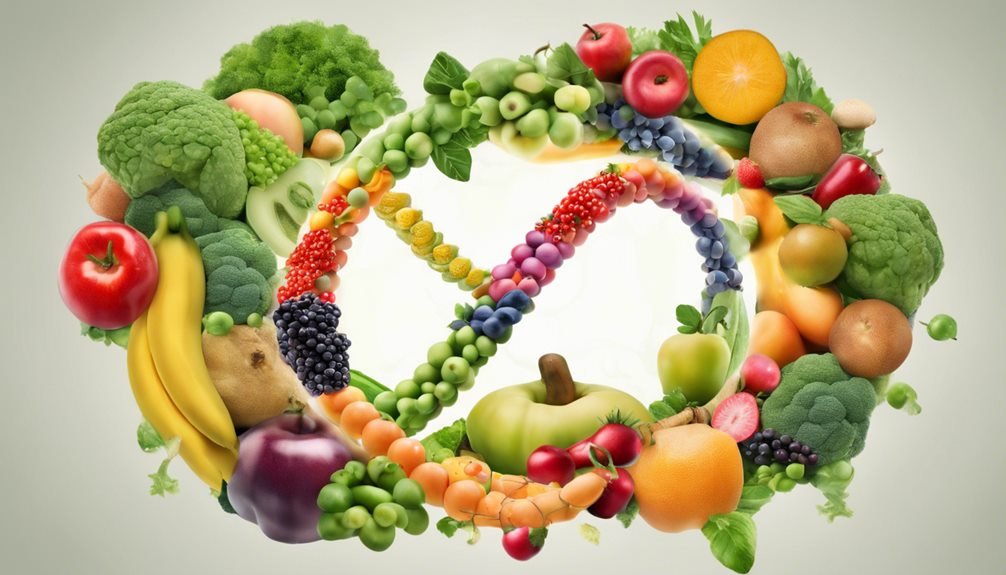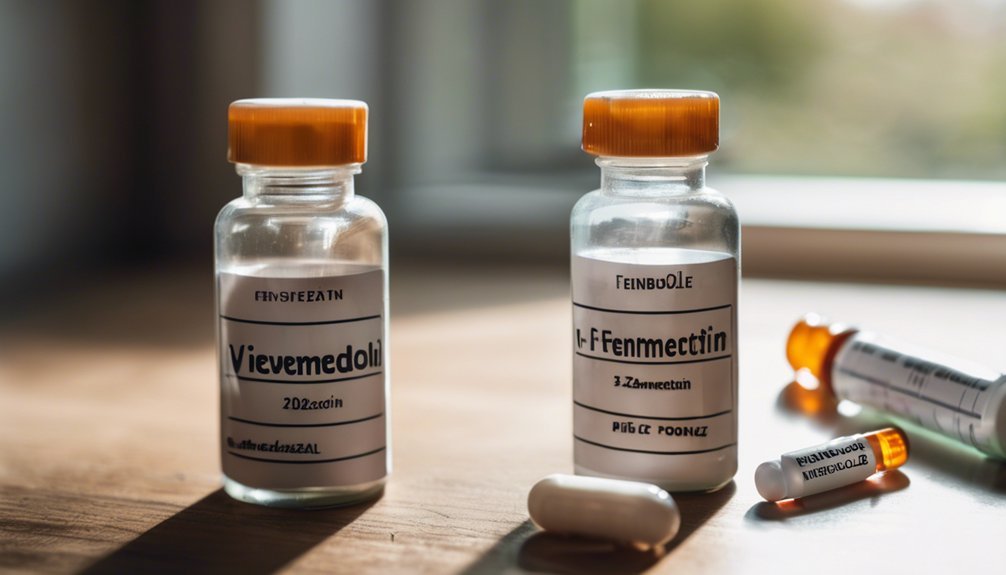When it comes to cancer therapy, the intricate interplay between epigenetics and diet holds significant implications. Imagine how the foods you consume could potentially influence the way your genes behave in the context of cancer treatment. Exploring this dynamic relationship opens up a world of possibilities in tailoring therapies to target specific epigenetic modifications driven by dietary factors. Understanding these nuances could pave the way for more effective and personalized approaches to combating cancer.
Key Takeaways
- Diet influences epigenetic changes in cancer cells.
- Nutrients like folate and polyphenols affect DNA methylation.
- Phytochemicals in foods modulate gene expression patterns.
- Omega-3 fatty acids impact inflammation-related gene expression.
- Personalized diets based on epigenetic profiles optimize cancer therapy.
Epigenetic Changes in Cancer
Epigenetic changes play a crucial role in the development and progression of cancer. Cancer progression is influenced by alterations in gene expression driven by epigenetic mechanisms. These changes can lead to the activation of oncogenes or the silencing of tumor suppressor genes, ultimately contributing to tumor initiation and growth.
Epigenetic mechanisms such as DNA methylation, histone modifications, and non-coding RNAs have been extensively studied in various types of cancer. Aberrant DNA methylation patterns, for example, can result in the silencing of genes involved in cell cycle regulation or DNA repair, promoting uncontrolled cell division and genomic instability.
Histone modifications, on the other hand, can impact chromatin structure and gene accessibility, affecting the expression of genes critical for cancer development.
Non-coding RNAs like microRNAs can also regulate gene expression post-transcriptionally, influencing key pathways involved in tumor progression.
Understanding these epigenetic changes in cancer is essential for developing targeted therapies that can reverse these alterations and potentially halt or even reverse cancer progression.
Role of Diet in Epigenetics
The relationship between diet and epigenetics is a burgeoning field of research that sheds light on how dietary components can influence gene expression patterns. Nutritional epigenetics explores how specific nutrients and bioactive compounds in our diets can modify epigenetic marks, such as DNA methylation and histone modifications, thereby impacting gene expression without altering the underlying DNA sequence. Dietary influences play a crucial role in shaping our epigenome, with studies pointing to the ability of certain foods to either promote or inhibit these epigenetic modifications.
For instance, cruciferous vegetables like broccoli and kale contain sulforaphane, a compound that has been shown to influence DNA methylation patterns.
Similarly, bioactive compounds found in green tea and turmeric have been linked to histone modifications that affect gene transcription. By understanding how different dietary components interact with our epigenome, we can make informed choices to support optimal gene expression and potentially reduce the risk of diseases like cancer through targeted dietary interventions.
Epigenetic Therapies for Cancer

Researchers have made significant strides in developing targeted therapies that leverage epigenetic mechanisms to treat various types of cancer. These therapies hold promise in revolutionizing cancer treatment by specifically targeting the epigenetic alterations that drive cancer progression.
Here are some key points to consider:
- Potential Therapies: Epigenetic therapies include DNA methyltransferase inhibitors, histone deacetylase inhibitors, and bromodomain inhibitors. These drugs target specific enzymes involved in epigenetic modifications to restore normal gene expression patterns in cancer cells.
- Clinical Implications: Clinical trials evaluating the efficacy of epigenetic therapies have shown promising results in various types of cancers, such as leukemia, lymphoma, and solid tumors. These therapies not only offer new treatment options but also hold the potential to overcome drug resistance and improve patient outcomes.
- Personalized Medicine: Epigenetic profiling of tumors allows for the identification of specific epigenetic alterations in individual patients. This personalized approach enables oncologists to tailor treatment strategies by selecting the most effective epigenetic therapy based on the patient's unique epigenetic profile.
Impact of Nutrition on Genes
Numerous studies have demonstrated the profound impact of dietary choices on gene expression, highlighting the intricate interplay between nutrition and our genetic makeup. Nutritional influences play a crucial role in gene regulation, affecting how genes are turned on or off, ultimately influencing various cellular processes.
For instance, certain nutrients like folate and vitamin B12 are essential for DNA methylation, a key epigenetic mechanism regulating gene expression. Conversely, diets high in saturated fats have been linked to altered gene expression patterns associated with inflammation and cancer development.
Furthermore, specific dietary components such as phytochemicals in fruits and vegetables have been shown to modulate gene expression related to antioxidant pathways, potentially reducing the risk of cancer. On the other hand, excessive consumption of processed foods and sugar can lead to epigenetic changes that promote tumor growth.
Understanding the intricate relationship between nutritional influences and gene regulation is crucial in developing personalized dietary interventions to optimize health outcomes and potentially aid in cancer therapy.
Dietary Factors and Gene Expression

When considering dietary factors and their impact on gene expression, it becomes evident that the food choices we make play a significant role in how our genes function. Nutritional interventions can directly influence gene regulation, affecting the activation or suppression of specific genes crucial for cancer development and progression.
Here are three key points to consider:
- Phytochemicals: Compounds found in plant-based foods like fruits, vegetables, and whole grains can modulate gene expression. For example, sulforaphane in broccoli has been shown to regulate genes involved in cancer cell growth.
- Omega-3 Fatty Acids: These essential fatty acids, abundant in fish, flaxseeds, and walnuts, can impact gene expression related to inflammation and cell proliferation, potentially influencing cancer progression.
- Antioxidants: Substances like vitamin C, E, and selenium found in various foods can regulate gene expression by reducing oxidative stress and DNA damage, which are linked to cancer development.
Epigenetic Modifications in Tumors
In the realm of cancer biology, the intricate interplay between dietary factors and gene expression extends into the realm of epigenetics, specifically in the context of tumor development. Tumors create a complex environment known as the tumor microenvironment, where various cell types, signaling molecules, and extracellular matrix components interact. Within this environment, epigenetic modifications play a crucial role in regulating gene expression patterns that drive tumor growth, invasion, and metastasis.
Epigenetic inhibitors are a class of compounds that target enzymes responsible for adding or removing epigenetic marks on DNA and histones. These inhibitors have shown promise in altering the epigenetic landscape of tumors, leading to changes in gene expression profiles that can inhibit tumor progression.
By targeting specific epigenetic modifications, such as DNA methylation or histone acetylation, researchers aim to reprogram the gene expression patterns in tumors to reduce their aggressiveness and enhance sensitivity to conventional cancer therapies.
Understanding the intricate relationship between epigenetic modifications and tumor development provides valuable insights into potential therapeutic strategies that target the epigenome to combat cancer effectively.
Nutritional Epigenetics in Cancer

A critical aspect in understanding the intricate relationship between dietary factors and cancer lies in the emerging field of nutritional epigenetics. Nutritional interventions play a crucial role in modulating gene expression through epigenetic mechanisms, offering promising avenues for cancer prevention.
- Dietary Components: Certain nutrients, such as folate, phytochemicals, and fatty acids, have been shown to influence DNA methylation patterns, impacting cancer susceptibility.
- Epigenetic Modifiers: Compounds like resveratrol and sulforaphane found in foods like grapes and cruciferous vegetables can alter histone modifications, potentially reducing the risk of cancer development.
- Personalized Nutrition: Tailoring diets based on individual epigenetic profiles may enhance the effectiveness of cancer prevention strategies, highlighting the importance of a personalized approach in healthcare.
Understanding the interplay between nutrition and epigenetics can provide valuable insights into designing effective dietary strategies for cancer prevention. By incorporating specific foods and supplements, individuals can potentially influence their epigenome to mitigate cancer risks and promote overall well-being.
Diet-Induced Epigenetic Alterations
The impact of dietary choices on epigenetic modifications is a fascinating area of research that sheds light on the potential mechanisms underlying cancer development and progression. Nutritional influences play a crucial role in shaping epigenetic mechanisms, influencing gene expression patterns that can either promote or suppress cancer growth.
Certain dietary components, such as folate, selenium, and polyphenols found in fruits and vegetables, have been shown to modulate epigenetic marks like DNA methylation and histone modifications.
For example, folate deficiency can lead to aberrant DNA methylation patterns, potentially contributing to cancer initiation and progression.
Conversely, a diet rich in bioactive compounds like sulforaphane from cruciferous vegetables can enhance histone deacetylase activity, leading to the suppression of oncogenes.
These findings highlight the intricate interplay between nutritional factors and epigenetic regulation in cancer.
Understanding how diet-induced epigenetic alterations impact cancer development is crucial for designing personalized dietary interventions that can target specific epigenetic modifications associated with tumorigenesis.
Epigenetic Biomarkers in Diet

With the growing recognition of the intricate relationship between diet and epigenetic modifications, the identification of epigenetic biomarkers influenced by dietary factors has emerged as a key area of interest in cancer research.
- Dietary Epigenetics: Various dietary components such as folate, genistein, and sulforaphane have been found to modulate epigenetic marks like DNA methylation and histone modifications, influencing gene expression in cancer cells.
- Nutrition Biomarkers: Specific dietary patterns can alter the levels of biomarkers like microRNAs, long non-coding RNAs, and DNA methylation patterns, which can serve as indicators of cancer risk or progression.
- Epigenetic Profiling: Advanced technologies like high-throughput sequencing allow researchers to conduct comprehensive analyses of epigenetic changes induced by different dietary interventions, aiding in the identification of novel biomarkers for cancer diagnosis and treatment monitoring.
Understanding the impact of dietary epigenetics and nutrition biomarkers on cancer development and progression opens new avenues for personalized dietary interventions and targeted therapies based on individual epigenetic profiles.
Dietary Strategies for Cancer Treatment
Enhancing the efficacy of cancer treatment through strategic dietary interventions involves a meticulous integration of specific nutrients and compounds known to influence epigenetic mechanisms. Dietary interventions play a crucial role in cancer therapy by targeting the nutritional needs of the body to support treatment outcomes. By focusing on nutritional targeting, individuals can optimize their diets to potentially enhance the effectiveness of traditional cancer therapies.
Incorporating dietary interventions rich in antioxidants, such as fruits and vegetables, can help combat oxidative stress and inflammation, which are key factors in cancer development. Additionally, including foods high in fiber, like whole grains and legumes, can aid in maintaining a healthy gut microbiome, which is linked to improved immune function and reduced inflammation.
Furthermore, omega-3 fatty acids found in fatty fish or flaxseeds have shown promise in reducing cancer cell growth and inflammation. By adopting a well-rounded diet that emphasizes specific nutrients and compounds, individuals can support their body's natural defenses and potentially improve cancer treatment outcomes.
Epigenetic Regulation by Diet

Numerous studies have underscored the intricate interplay between dietary components and epigenetic modifications, shedding light on the critical role of diet in regulating gene expression patterns associated with cancer development and progression. When considering epigenetic regulation by diet, here are three key points to keep in mind:
- Dietary Interventions: Certain nutrients present in our diet, such as folate, selenium, and polyphenols, have been shown to influence DNA methylation and histone modifications, thereby impacting gene expression linked to cancer pathways.
- Epigenetic Mechanisms: Components of our diet can directly affect enzymes involved in epigenetic modifications. For example, sulforaphane from cruciferous vegetables can modulate histone deacetylase activity, altering the epigenetic landscape in cancer cells.
- Personalized Nutrition: Tailoring dietary recommendations based on an individual's epigenetic profile may optimize cancer therapy outcomes. This approach considers how specific dietary interventions can target epigenetic changes unique to each person's cancer biology, highlighting the potential of personalized nutrition in cancer treatment.
Future of Epigenetics in Oncology
In the realm of oncology, the future of epigenetics holds immense promise for revolutionizing cancer treatment strategies. Clinical implications of epigenetic modifications are increasingly being recognized, paving the way for personalized and targeted therapies in cancer. Therapeutic advancements in the field of epigenetics offer new avenues for precise interventions that could potentially enhance treatment outcomes and minimize adverse effects.
| Clinical Implications | Therapeutic Advancements |
|---|---|
| Personalized treatment plans | Epigenetic drugs development |
| Early detection strategies | Targeted gene therapies |
| Prognostic biomarkers | Precision medicine approaches |
| Risk assessment tools | Immunotherapy combinations |
| Minimal residual disease monitoring | Novel drug delivery systems |
These developments highlight the transformative potential of epigenetics in shaping the future landscape of oncology, emphasizing the importance of understanding and leveraging epigenetic mechanisms in the fight against cancer.
Frequently Asked Questions
Can Specific Foods Reverse All Types of Epigenetic Changes in Cancer?
Specific foods may have a limited impact on reversing all types of epigenetic changes in cancer. While nutritional interventions can influence some epigenetic mechanisms, such as DNA methylation and histone modifications, their ability to completely reverse all cancer-related epigenetic changes isn't fully understood. Incorporating a balanced diet rich in antioxidants, vitamins, and minerals may support overall health and potentially aid in cancer prevention or treatment, but it isn't a guaranteed solution for all epigenetic alterations in cancer cells.
How Do Different Diets Affect Epigenetic Modifications in Tumors?
When considering how different diets affect epigenetic modifications in tumors, it's crucial to understand the impact of nutritional interventions on epigenetic mechanisms. Certain foods can influence gene expression by altering DNA methylation and histone modifications in cancer cells.
Are There Any Dietary Supplements That Can Alter Epigenetic Biomarkers?
When considering dietary supplements that may alter epigenetic biomarkers, nutritional interventions play a crucial role. Certain supplements like folate, vitamin B12, and polyphenols have shown potential in influencing epigenetic modifications. These substances can impact DNA methylation patterns and histone modifications, potentially leading to changes in gene expression.
It's important to consult with healthcare professionals before incorporating any dietary supplements to ensure they align with your individual health needs and goals.
Can a Personalized Diet Plan Help in Targeting Specific Epigenetic Therapies?
Imagine a diet plan tailored just for you, like a precision tool targeting specific areas to enhance your well-being. Nutritional interventions, when personalized, can complement targeted therapies, amplifying their effects.
Is There a Recommended Diet to Prevent Epigenetic Alterations in Cancer?
To prevent epigenetic alterations in cancer, consider a diet rich in whole foods like fruits, vegetables, and whole grains. These foods are packed with nutrients that can help maintain healthy DNA methylation patterns.
Additionally, incorporating lifestyle factors such as regular physical activity and stress management can also play a role in supporting overall epigenetic stability.
Conclusion
You now hold the key to unlocking the potential of epigenetics in cancer therapy through dietary interventions. By harnessing the power of specific nutrients to modulate gene expression patterns, you have the ability to reshape the epigenetic landscape of cancer cells. With personalized dietary strategies and targeted epigenetic therapies, you can revolutionize the way we approach cancer treatment. The future of oncology lies in your hands – make the most of it.





